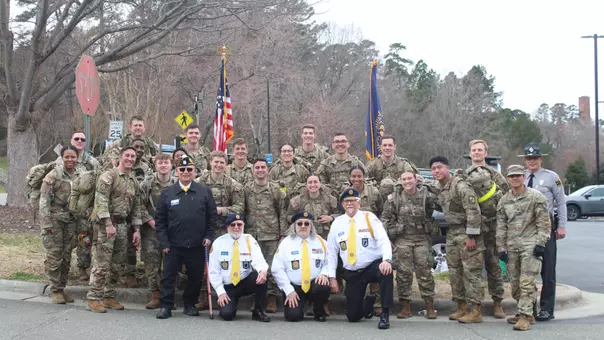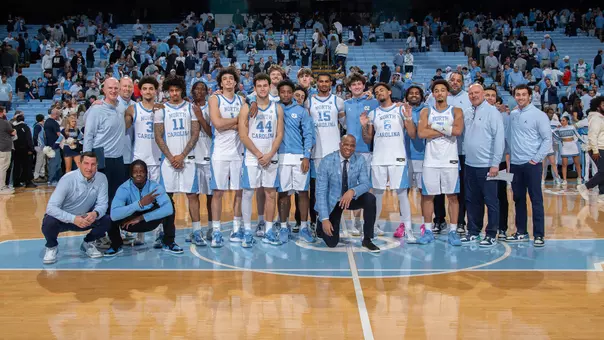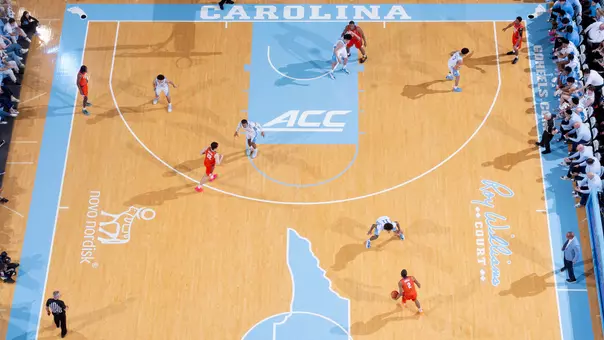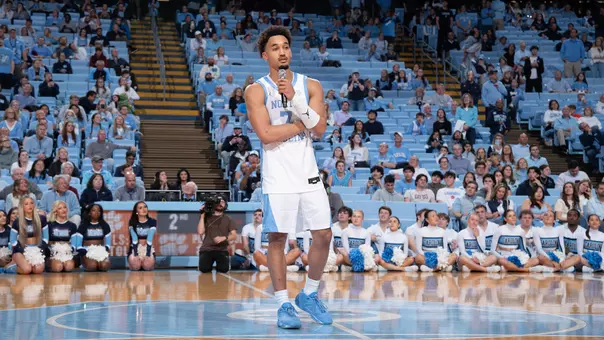University of North Carolina Athletics
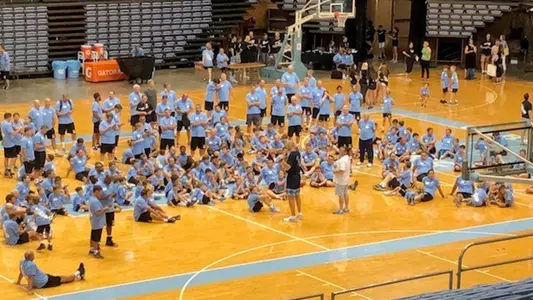
Lucas: Camp Impact Continues
June 18, 2019 | Men's Basketball, Featured Writers, Adam Lucas
A hospital visit by Eric Montross 25 years ago remains impactful.
By Adam Lucas
Lindy Clark still remembers the first time Eric Montross walked into her life.
Clark was sitting with her 15-year-old son, Jason, in a room at UNC Hospital--before there was a freestanding UNC Children's Hospital--in 1993. Her son was battling cancer, and the days can get very repetitive inside a hospital. That's when Montross, the starting center on Carolina's newly minted championship team, entered the room.
"Jason was in the bed and I was in the chair," Lindy remembers today. "Eric knocked, and we were expecting a nurse or a doctor. He came in, and he had to bend his head just to enter the room because he's so tall. Jason was so happy and surprised. And the first thing Eric said was, 'Jason, I've been looking for you for weeks!'"
Montross made the connection through a fishing buddy, and had been looking for Clark during his regular visits to the clinic. He eventually decided to make a direct visit to the family's room, beginning a relationship that would last much longer than anyone involved could have guessed.
Lindy Clark certainly wasn't thinking 25 years ahead on that day in 1993. She was merely trying to get through the next day, and then the next. When it became clear Jason wouldn't survive—he passed away in February of 1994—he was asked for suggestions that would make the hospital more child-friendly. He responded with a nine-page list.
And over the past 25 years, the Eric Montross Father's Day Basketball Camp—which was first held in 1995, and will convene for the 25thtime this weekend in Chapel Hill—has methodically worked through that list. The event has raised over $1.7 million. The improvements began with the Jason Clark Teen Activity Lounge, where patients can—for just a few blessed minutes—be a regular kid instead of being surrounded by doctors and nurses.
Beth Bailey managed the Lounge for over two decades. "It allows the children who are at least ten years old a place to be more active," she says. "This helps them more than they realize or are aware. The additional physical activity may also assist in their recovery process, which will get them discharged and home quicker. Both the game room and teen lounge promote normalcy. The teen lounge provides a space just for the teenagers to allow them to be teenagers—without adults around, if that is what they choose."
It's such a simple concept that most of us who haven't had our children spend extended time in the hospital probably wouldn't understand.
"The big thing Jason said to us was that kids in the hospital didn't want to be a room number," Lindy says. "They wanted to have a place to go where they could just be kids. We wanted a place where kids would want to go even if they weren't sick. That's what pushed it. And still today, I still feel this need to have his voice heard for all those kids who are still here and are still sick."
The impact on the Children's Hospital from the Montross Camp—and, in turn, from Jason Clark—is significant. In addition to the teen room, the camp has helped fund murals throughout the hospital, medical simulation mannequins, a pediatric short stay unit, a pediatric infusion suite, a pediatric dialysis center, multiple pieces of high-tech medical equipment and numerous other improvements.
For everyone involved, it's been more than just writing a check. Eric and Laura Montross are closely involved with the Children's Hospital. The Clark family will once again be on the scene for camp this weekend, where every camper—even if they don't realize it—will be impacted by Jason's spirit. The connection between the basketball program and Children's Hospital remains strong, including the close relationships with patients formed by players such as Luke Maye.
To many of us, Jason Clark was a cancer patient. But to Lindy Clark and the rest of her family, he was her son, who did so much more than just fight cancer. That's the feeling she tries to keep alive at camp, and so enrollment is limited to allow a more personal experience for the campers. Jason attended numerous large basketball camps; Lindy knew he would value a camp where kids get to interact more closely with their heroes.
The personal touch and attention to detail has created an event that thrives. The waiting list is long, and numerous families have returned year after year. Once their kids age out, the families often move into a volunteer role, just so they can be around the sense of community created at camp every June.
It's basketball that brings those people together. But it's the entire University community that benefits.
"Health care is a team sport," says Dr. Benny Joyner, the Division Chief of Pediatric Critical Care Medicine, whose program has benefited directly from camp funds. "I can't tell you how much of a boost it is not just for the patients but for the staff to know that Carolina athletics cares about them. There are so many more Carolina fans as a result. This is the legacy of Carolina athletics. It's not just about a sports team or an individual. It's about the whole person and the whole community."
At some point this weekend, Lindy Clark will stand on the Smith Center concourse and watch the kids high-fiving current and former Tar Heel players. She'll watch dads try to play it cool while they're also fulfilling a dream of playing basketball on the Smith Center court. She'll see the red balloon that's used every year at camp, a reminder of a similar red balloon given to the family when Jason was in the hospital. The idea was to release it when he'd finished his treatment. Instead, it keeps watch over camp each year, a reminder of how this all began and what the purpose continues to be.
"We were just trying to survive the worst thing that ever happened to us," Lindy says. "All you can do is try to turn it around and make the worst thing a tiny bit better. If you can help other people who are going through it, then that's what you do. It's Jason's spirit that carries this camp. We're doing this because kids should not be forgotten. Every single kid in that hospital, and every single mom and dad with a kid in that hospital, need to know that people care."
To learn more about how to participate in camp, or to contribute to the camp's mission, click here.
Lindy Clark still remembers the first time Eric Montross walked into her life.
Clark was sitting with her 15-year-old son, Jason, in a room at UNC Hospital--before there was a freestanding UNC Children's Hospital--in 1993. Her son was battling cancer, and the days can get very repetitive inside a hospital. That's when Montross, the starting center on Carolina's newly minted championship team, entered the room.
"Jason was in the bed and I was in the chair," Lindy remembers today. "Eric knocked, and we were expecting a nurse or a doctor. He came in, and he had to bend his head just to enter the room because he's so tall. Jason was so happy and surprised. And the first thing Eric said was, 'Jason, I've been looking for you for weeks!'"
Montross made the connection through a fishing buddy, and had been looking for Clark during his regular visits to the clinic. He eventually decided to make a direct visit to the family's room, beginning a relationship that would last much longer than anyone involved could have guessed.
Lindy Clark certainly wasn't thinking 25 years ahead on that day in 1993. She was merely trying to get through the next day, and then the next. When it became clear Jason wouldn't survive—he passed away in February of 1994—he was asked for suggestions that would make the hospital more child-friendly. He responded with a nine-page list.
And over the past 25 years, the Eric Montross Father's Day Basketball Camp—which was first held in 1995, and will convene for the 25thtime this weekend in Chapel Hill—has methodically worked through that list. The event has raised over $1.7 million. The improvements began with the Jason Clark Teen Activity Lounge, where patients can—for just a few blessed minutes—be a regular kid instead of being surrounded by doctors and nurses.
Beth Bailey managed the Lounge for over two decades. "It allows the children who are at least ten years old a place to be more active," she says. "This helps them more than they realize or are aware. The additional physical activity may also assist in their recovery process, which will get them discharged and home quicker. Both the game room and teen lounge promote normalcy. The teen lounge provides a space just for the teenagers to allow them to be teenagers—without adults around, if that is what they choose."
It's such a simple concept that most of us who haven't had our children spend extended time in the hospital probably wouldn't understand.
"The big thing Jason said to us was that kids in the hospital didn't want to be a room number," Lindy says. "They wanted to have a place to go where they could just be kids. We wanted a place where kids would want to go even if they weren't sick. That's what pushed it. And still today, I still feel this need to have his voice heard for all those kids who are still here and are still sick."
The impact on the Children's Hospital from the Montross Camp—and, in turn, from Jason Clark—is significant. In addition to the teen room, the camp has helped fund murals throughout the hospital, medical simulation mannequins, a pediatric short stay unit, a pediatric infusion suite, a pediatric dialysis center, multiple pieces of high-tech medical equipment and numerous other improvements.
For everyone involved, it's been more than just writing a check. Eric and Laura Montross are closely involved with the Children's Hospital. The Clark family will once again be on the scene for camp this weekend, where every camper—even if they don't realize it—will be impacted by Jason's spirit. The connection between the basketball program and Children's Hospital remains strong, including the close relationships with patients formed by players such as Luke Maye.
To many of us, Jason Clark was a cancer patient. But to Lindy Clark and the rest of her family, he was her son, who did so much more than just fight cancer. That's the feeling she tries to keep alive at camp, and so enrollment is limited to allow a more personal experience for the campers. Jason attended numerous large basketball camps; Lindy knew he would value a camp where kids get to interact more closely with their heroes.
The personal touch and attention to detail has created an event that thrives. The waiting list is long, and numerous families have returned year after year. Once their kids age out, the families often move into a volunteer role, just so they can be around the sense of community created at camp every June.
It's basketball that brings those people together. But it's the entire University community that benefits.
"Health care is a team sport," says Dr. Benny Joyner, the Division Chief of Pediatric Critical Care Medicine, whose program has benefited directly from camp funds. "I can't tell you how much of a boost it is not just for the patients but for the staff to know that Carolina athletics cares about them. There are so many more Carolina fans as a result. This is the legacy of Carolina athletics. It's not just about a sports team or an individual. It's about the whole person and the whole community."
At some point this weekend, Lindy Clark will stand on the Smith Center concourse and watch the kids high-fiving current and former Tar Heel players. She'll watch dads try to play it cool while they're also fulfilling a dream of playing basketball on the Smith Center court. She'll see the red balloon that's used every year at camp, a reminder of a similar red balloon given to the family when Jason was in the hospital. The idea was to release it when he'd finished his treatment. Instead, it keeps watch over camp each year, a reminder of how this all began and what the purpose continues to be.
"We were just trying to survive the worst thing that ever happened to us," Lindy says. "All you can do is try to turn it around and make the worst thing a tiny bit better. If you can help other people who are going through it, then that's what you do. It's Jason's spirit that carries this camp. We're doing this because kids should not be forgotten. Every single kid in that hospital, and every single mom and dad with a kid in that hospital, need to know that people care."
To learn more about how to participate in camp, or to contribute to the camp's mission, click here.
Players Mentioned
UNC Women's Lacrosse: Humphrey Fires Tar Heels Past Clemson, 12-9
Thursday, March 05
UNC Softball: Long Ball Propels Heels Over Stetson, 12-4
Thursday, March 05
THE ARENA DISCUSSION - Episode 2: Rick Steinbacher
Wednesday, March 04
MBB: Seth Trimble Senior Speech - March 3, 2026
Wednesday, March 04

